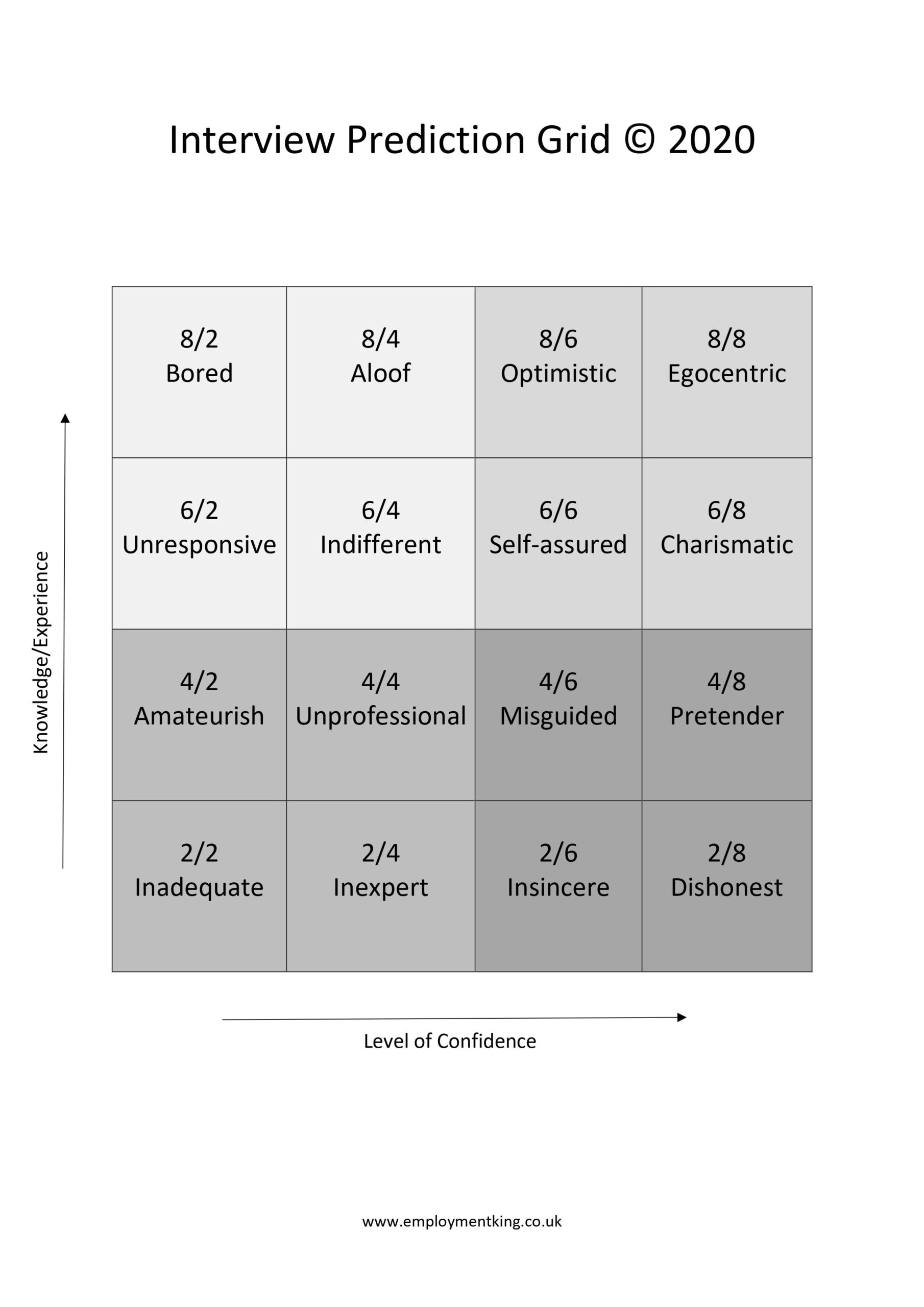Congratulations on completing the Interview Prediction Grid Test (IPG) ©2020.
Below is a breakdown of your Interview Identity
2/8 Dishonest

Possessing the highest level of confidence and the lowest level of knowledge/experience increases verbal diarrhoea. The distance between the two axes; low knowledge/experience and high levels of confidence, sends off warning signals to the employer, creating the feeling of distrust.
The 2/8 – Dishonest interviewee will answer interview questions quickly, assertively and confidently to cover up a lack of knowledge/experience. But this approach can come across as false, especially if the applicants state confidently that they possess a skill/experience that they don’t have.
As we have discussed, self-promotion and rapport building influence the job interview, and hiring decisions are often based on initial impressions. With this in mind a 2/8 – Dishonest interviewee can be viewed, initially, to be more employable than they actually are, especially if the interviewee isn’t an expert.
Often, overconfident interviewees will believe that they will be an asset to any organisation. Without a higher level of expertise, it is unlikely, but not impossible, that they would be offered any position above a low-skilled role. This comes down to the scoring system of the structured job interview.
Strengths
Everything about the applicant oozes confidence: relaxed posture, warming smile, and a natural ability to make other, more senior career professionals, ask for their opinion. Even the candidate’s outfit, walk and tonality create the impression of a self-assured individual.
Often, when going to meet the interviewee, the interviewer will find the candidate having a relaxed conversation with the receptionist, helping to create a positive first impression. Once the employer introduces themselves, the confident applicant will give their full attention to the interviewer; strong eye contact, a powerful handshake and a confident introduction, all help to build the feeling of trust from the outset.
In the interview, it will often be the interviewee, not the interviewer, who will generate small talk, finding common interest to discuss. This ability to create rapport with everyone they meet, reassures interviewers that they offered the interview appointment to the right candidate.
Each interview answer is delivered using stories and anecdotes, creating interest in the interview panel. When listening to the interviewers, the 2/8 – Dishonest interviewee will nod along and agree with their comments and ideas, using the ‘if I like you, you will like me’ psychological process for rapport building.
Development
The high level of confidence can be enough to win some employers’ trust, increasing job offers, but this really depends on which type of low-skilled position the applicant is applying for.
In the main, employers require a level of knowledge and experience for an interviewee to be successful. As the interviewer questions overconfident applicants on their understanding of the job criteria and their sector knowledge, rapport starts to break down.
The employer has expected the candidate to be an industry expert or at least to have a medium level of knowledge and experience, presumed through the candidate’s high level of confidence. The nodding and agreement with the interviewer’s points, from the candidate, would be viewed as having similar opinions (a likeability factor) but as the falsehood is uncovered the interviewers will feel that they have been deceived, breaking rapport and seeding distrust.
What is needed here, is an understanding of the job criteria (rule 1 of a successful interview) to help form a structured interview answer. Even with a list of criteria it can be hard for a low level of experience applicant to state enough relevant knowledge/experiences to gain high-scoring interview answers.
To overcome this obvious barrier the job hunter needs to gain an industry related qualification and/or sector experience. Gaining even a minimum understanding of a sector and having industry-related work experience, when combined with a high level of confidence can result in accelerated career advancement.
Being able to show understanding of an industry, along with a high level of confidence is enough to be seen as credible and likeable: a winning combination.

Advice for the job interview
- Agree, rather than disagree, if an employer picks up on any industry related errors discussed during an interview answer. To avoid confrontation, use an agreement frame, “Yes, of course you are correct, what I meant to say was …”
- Promote your high level of confidence as a specialised skill, backing this skill up with other valuable, industry-related, qualities
- Generate a conversation. Ask additional questions, and give the employer your full attention as this generates a powerful level of likeability
Research: IPG





















